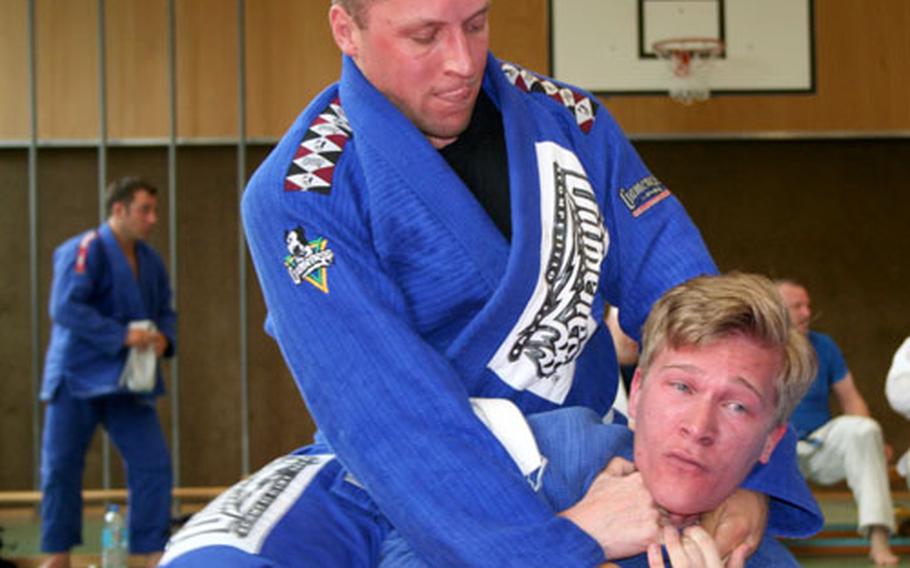
Army Staff Sgt. Micheal Czarnecki of Hohenfels applies a collar choke to Adam Pontnak of Heidelberg during a match in the absolute division of a submission fighting match on Sept. 3 in Garmisch, Germany. (Courtesy of Army Sgt. David Rosenmarkle)
Are you into pain?
Choke holds, head scissors and small-joint manipulation?
Those who are might want to check out the TVG Submission Open on Feb. 18 at Turn-Verein Garmisch in Garmisch, Germany.
The Brazilian jiu-jitsu, submission-fighting event is like wrestling but it’s not for everyone, according to Army Sgt. David Rosenmarkle, the event coordinator and warehouse manager at the George C. Marshall European Center for Security Studies.
“If someone told me they’ve never done this before but wanted to participate, I’d tell them they should get educated first,” Rosenmarkle said. “You can find almost anyone on these (military) bases who knows about it.”
About 30 fighters have committed so far, Rosenmarkle said, including soldiers from Grafenwöhr, Hohenfels and the German army. He expected about 50 fighters total for this tournament, his third in Garmisch.
Matches are five minutes long. Fighters are awarded points along the way — two points for a takedown with advantage, four points for a mount, etc. If fighters are tied after five minutes, two minutes of overtime and sudden death (not literally) are added to settle things.
Ways to win: Score the most points. Or make an opponent verbally quit or tap out.
There are five weight classes, as well as an absolute division that has no weight or time limits.
Deacon Westervelt, a graphics artist at the Marshall Center, said he got beat up regularly when he started competing a year and a half ago.
“Then I started beating people, and beating people twice my size,” Westervelt said. “I thought, ‘this is pretty cool,’ and I’ve been hooked ever since. It does hurt, but it’s temporary pain.”
Not everything is allowed.
There’s no punching or kicking, no biting or eye-gouging. Fish-hooking (fingers in the mouth) and heel hooks, which can snap an ankle, are banned.
Neck cranks are good to go.
“The pain from them is pretty immediate and could cause spinal damage,” Rosenmarkle said. “But I allow it because it is submission wrestling and I want the guys to able to use as many weapons as they can.”
No sense, however, in crossing the threshold between pain and permanent injury, Rosenmarkle said.
In his first tournament, Rosenmarkle said he had to stop a fight because a fighter’s arm was hyper-extended and he heard two ligaments pop, yet the fighter wouldn’t quit.
“One of my biggest things is fighter safety,” he said. “Everybody likes to fight, and everybody likes to train. The holds you put them in can be crippling. As the referee, I’m always on top of what’s going on. You always want to ensure the fighters’ safety.”
Check out the Web site at: www.outrival.org.